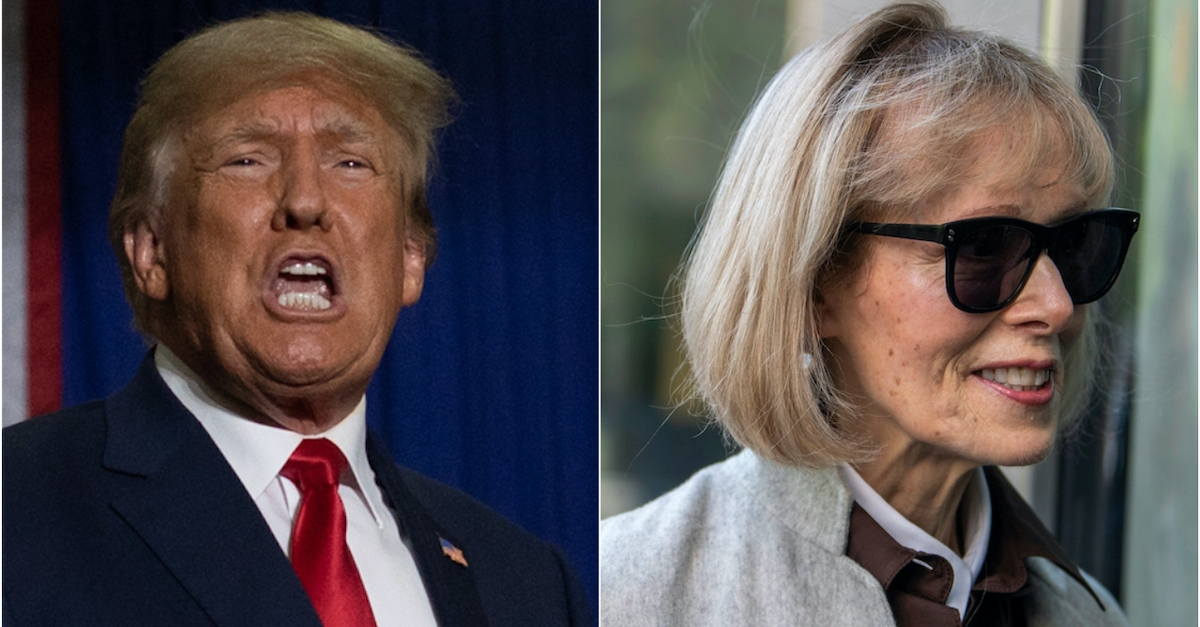
Donald Trump appears at a rally. E. Jean Carroll enters federal court in Manhattan for the first day of trial against him. (Photos L-R: Emily Elconin/Getty Images; AP Photo/Brittainy Newman)
A judge in New York has denied Donald Trump’s request for a new trial and judgment after he lost the case brought by E. Jean Carroll and was ordered to pay the veteran writer he sexually abused and defamed $88.3 million earlier this year, saying the former president’s “hatred and disdain was on full display.”
Senior U.S. District Judge Lewis Kaplan issued the scathing ruling Thursday, calling the former president’s claims “without merit” as they pertain to the alleged “erroneous” jury instruction that “common-law malice” was “independently sufficient to taint the jury verdict and warrant a new trial.”
Under long-standing First Amendment rules around “actual malice,” Kaplan explained that it is a requirement in some defamation cases to prove actual malice and that defamatory statements made are made with or without the knowledge that they were false. This typically goes toward the defendant’s state of mind.
In the state of New York, there is a slightly different version of ” common law malice interpreted but Kaplan said nonetheless, Trump’s take was off-kilter. In sum, he explained that the mere existence of common law malice “does not defeat the conditional privilege unless it is the sole motive for the defamation.”
And Trump’s motivations were on display before the jury, the judge said. The punitive damages he was forced to pay, as such, aligned with that.
The Supreme Court has already determined that punitive damages can be awarded based on the “degree of reprehensibility” of a defendant’s actions, the “disparity” between the harm and potential harm and the size of the award, and finally, the difference between the remedy in one case and another comparable one.
“The Court agrees with plaintiff that each of these three guideposts more than justifies the punitive damages awarded by the jury. However, it is worth emphasizing the particular reprehensibility and severity that the jury could have found accurately characterized Mr. Trump’s conduct, which the Supreme Court has said is ‘[p]erhaps the most important indicium of the reasonableness of a punitive damages award,'” Kaplan wrote.
He went on to slam Trump, saying he used the “loudest ‘bully pulpit’ in America and possibly the world” to issue repeated defamatory statements against Carroll, including saying she was a “politically and financially motivated liar” who was “too unattractive for him to have sexually assaulted and threatening that she would ‘pay dearly’ for speaking out.”
The jury could have found that he wielded his power as arguably “the most powerful and famous man in the world to broadcast his lies to millions of dedicated followers in an effort to destroy Ms. Carroll’s credibility” or to “punish” her for speaking out or to deter other women from doing the same.
“It could have found also that he continued his attacks over the nearly five years that it took this case to come to a verdict,” Kaplan wrote. [Emphasis original]
Even during the course of trial, he “could not stop attacking” the writer and could be heard “repeatedly complaining to his counsel about proceedings, so much so that plaintiff’s counsel twice requested that the Court instruct him to stop.”
Seemingly exasperated, the judge said “most dramatically of all,” it was just minutes after Carroll’s lawyer ended her closing arguments that Trump “conspicuously stood and walked out of the courtroom for no apparent reason save to evidence his disapproval. ”
“On this exceptional record, the punitive damages evidence passes constitutional muster,” Kaplan wrote.
Have a tip we should know? [email protected]

.jpeg) 3 weeks ago
18
3 weeks ago
18











 English (US)
English (US)